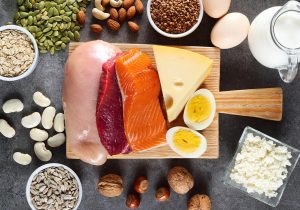
Understanding the importance of protein and its sources
It’s not just athletes and fitness fanatics that need to get plenty of protein. It seems like everyone is craving protein today, from active adults and growing kids to athletic teens and older individuals. This hunger for protein has launched diet fads and fixes that curb—or completely cut out—other food groups altogether. But, it’s not just the trends of the times that dictate just how important protein is. To understand the need for protein, get to the meat of the matter to see what’s the importance of protein to the health of a human being, along with the many benefits of this nourishing essential. Then, chew on the best sources of protein and how to get your fill. And, if you’re not wild about animal-based proteins, sink your teeth into tips for the best sources of protein for vegans. Satisfy your curiosity about protein and learn how to feed your needs.
Get a taste of protein
You don’t need to be a pro athlete to need to eat enough protein. Everybody needs proteins because they’re the building blocks of the body. Yet, few people realize just how important protein is to your body, your health, and your diet. So, what’s the importance of protein to the health of a human being? Well, every cell in your body contains proteins, which are made up of chains of amino acids. When these proteins get broken down during digestion, their amino acids support the healthy function, growth, and maintenance of all of the tissues, muscles, organs, bones, and processes in your body. While 20 amino acids make up the proteins throughout your body, nine of them are considered to be essential, which means that your body can’t produce them, so they have to come from food.
The power of protein
While high-protein crazes and phases have come and gone over the years, your body’s need for protein will never go out of style. To understand how important protein is to the way you feel and function, consider all of the ways that protein powers your body:
- Builds, maintains, and mends muscles
- Supports and repairs tissues
- Promotes athletic performance and recovery
- Carries oxygen through your body
- Boosts your immune system
- Creates hormones
- Strengthens your bones
- Grows hair and nails
- Burns fat
- Curbs cravings
- Lowers and regulates your appetite
- Improves your mood
The dish on the best sources of protein
Knowing just how important protein is to your overall health and well-being, you’ll want to get your fill. Luckily, there are plenty of ways to get protein in your diet from both animal and plant sources. With a helpful and healthy list of proteins, you can power-pack your meals and snacks with the best sources of protein for satisfaction:
- Fish and shellfish
- Poultry, like chicken and turkey
- Lean meats, including beef and pork
- Eggs
- Dairy products, such as milk, cheeses, and yogurt
- Beans, peas, and legumes
- Nuts and seeds
- Soy products, such as tofu and tempeh
A fresh look at sources of protein for vegans
When meat, dairy, fish, poultry, and eggs are off the table, you may wonder how to get enough protein. No animal products? No problem. With plant-based diets gaining momentum, more and more people are picking up vegetable proteins—whether they’re vegans or not. Plant-based, vegetable proteins are a vegan-friendly option that sprout from a garden of healthy plants. Most veggies contain some protein, such as mushrooms, potatoes, and broccoli. But the best sources of protein for vegans include certain vegetable proteins that may be new to you. Whether you’re a vegan, vegetarian, or just enjoying a meatless Monday, these are the best vegetable proteins found in nature:
- Beans of all kinds
- Lentils
- Chickpeas
- Peas
- Whole grains, like barley and bulgur wheat
- Ancient grains, such as amaranth and farro
- Oats
- Rice
- Nuts
- Seeds, including pumpkin, sunflower, flax, and chia seeds
- Hemp
- Nuts and nut butters
- Soy-based foods, like tofu and tempeh
Pro tips on recommended daily intake
Now that you realize the importance of protein to the health of a human being, how much protein do you need each day? Well, protein is a personal thing. The amount of protein you need depends on your age, health, sex, weight, and activity level. And if you’re pregnant, breastfeeding, or just getting older, you may need more than you think. The recommended daily intake of protein for healthy adults is 10% to 35% of your total calorie needs. Just remember that consuming too much protein is as bad as not getting enough. An excess of protein can cause kidney stones and raise your risk of heart disease and colon cancer. Speak to your SignatureMD-affiliated doctor to determine how to feed your body’s protein needs.
Now that you know the many pros of protein, start fueling your diet and your day with this healthy essential.